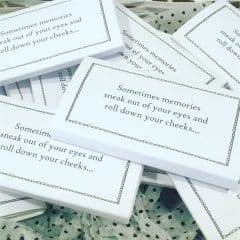








Poems and readings can be incredibly comforting at times of loss and their words and meaning can make them a very special part of a funeral. There are lots of well-known readings and bible verses that are traditionally used at funerals. If you are looking for a non-religious alternative, however, there are some beautiful poems to choose from. Here are 7 of our favourites – we have many other suggestions so please don’t hesitate to ask if you would like more ideas.
- Not, How Did He Die, But How Did He Live?
By Summer Sandercox
This short funeral verse is an uplifting poem about celebrating life and remembering someone who has made a positive impact on those around them.
Not, how did he die, but how did he live?
Not, what did he gain, but what did he give?
These are the units to measure the worth
Of a man as a man, regardless of his birth.
Nor what was his church, nor what was his creed?
But had he befriended those really in need?
Was he ever ready, with words of good cheer,
To bring back a smile, to banish a tear?
Not what did the sketch in the newspaper say,
But how many were sorry when he passed away?



- Death (If I Should Go)
By Joyce Grenfell
Joyce Grenfell was a British actress and satirical writer who became well known for her wry humour. This poem is often used as a funeral verse because of its sense of fun and positivity.
If I should go before the rest of you
Break not a flower nor inscribe a stone
Nor when I’m gone speak in a Sunday voice
But be the usual selves that I have known
Weep if you must
Parting is Hell
But life goes on
So sing as well.





- Roads Go Ever On
By J. R. R. Tolkien
Life is often described as a journey and funerals are a time to reflect on this, making this passage from The Lord of the Rings a popular choice for funerals, particularly non-denominational or humanist ceremonies. In this beautiful reading, Bilbo acknowledges that his journey is complete.
Roads go ever ever on,
Over rock and under tree,
By caves where never sun has shone,
By streams that never find the sea;
Over snow by winter sown,
And through the merry flowers of June,
Over grass and over stone,
And under mountains in the moon.
Roads go ever ever on
Under cloud and under star,
Yet feet that wandering have gone
Turn at last to home afar.
Eyes that fire and sword have seen
And horror in the halls of stone
Look at last on meadows green
And trees and hills they long have known.
Roads go ever on and on
Out from the door where it began.
Now far ahead the Road has gone,
Let others follow it who can!
Let them a journey new begin,
But I at last with weary feet
Will turn towards the lighted inn,
My evening-rest and sleep to meet.




- Dear Lovely Death
by Langston Hughes
We chose to include this poem because it introduces the idea of continuing bonds. You can read more about this on the Continuing Bonds section of our website. We have also written a blog What are Continuing Bonds which talks about how ,when someone dies, our relationship with them doesn’t end, but it changes. This poem talks about the way things take on new significance after someone has died.
Dear lovely Death
That taketh all things under wing—
Never to kill—
Only to change
Into some other thing
This suffering flesh,
To make it either more or less,
But not again the same—
Dear lovely Death,
Change is thy other name.





- Funeral Blues
BY W H Auden
This tender poem by Yorkshire-born writer W H Auden was introduced to a new generation by John Hannah in the 1994 film Four Weddings and a Funeral. It is full of emotion and can be incredibly moving when used as a funeral reading. Although the tone is far from uplifting, it can be helpful to some people to acknowledge the hugeness of their grief and this poem does that very well.
Stop all the clocks, cut off the telephone,
Prevent the dog from barking with a juicy bone,
Silence the pianos and with muffled drum
Bring out the coffin, let the mourners come.
Let airplanes circle moaning overhead
Scribbling on the sky the message “He is Dead”,
Put Crepe bows round the white necks of the public doves,
Let the traffic policemen wear black cotton gloves.
He was my North, my South, my East and West,
My working week and my Sunday-rest,
My noon, my midnight, my talk , my song;
I thought that love would last forever: I was wrong
The stars are not wanted now: put out every one;
Pack up the moon and dismantle the sun;
Pour away the ocean and sweep up the wood,
For nothing now can ever come to any good.





- She Is Gone (can also be read as He Is Gone)
By David Harkins
People often choose this gentle poem for the funeral of a mother. It was in fact read at the funeral of the Queen Mother. The words can be changed to make it suitable for a father’s funeral too. We think it’s a lovely verse to celebrate the life of anyone, not just a parent.
You can shed tears that she is gone
Or you can smile because she has lived
You can close your eyes and pray that she will come back
Or you can open your eyes and see all that she has left
Your heart can be empty because you can’t see her
Or you can be full of the love that you shared
You can turn your back on tomorrow and live yesterday
Or you can be happy for tomorrow because of yesterday
You can remember her and only that she is gone
Or you can cherish her memory and let it live on
You can cry and close your mind, be empty and turn your back
Or you can do what she would want: smile, open your eyes, love and go on.




- No Matter What
By Debi Gliori
Debi Gliori’s children’s book No Matter What deals with the big worries that little children often have. In the book, Small’s mother says reassuringly, “I’ll always love you, no matter what.” The excerpt below can be used as a tender reading for a funeral where young children may be present. It is also very comforting for all ages.
Small said, “But what about when we are dead and gone, will you love me then, does love go on?”
…Large (replied) “Look at the stars, how they shine and glow, some of the stars died a long time ago. Still they shine in the evening skies, for you see…love like starlight never dies…”





These are just a few of the many non-denominational readings that can be chosen for a funeral. Sometimes, the person who has died will have had a favourite book, author or poem and this could have significance. They may even have shared an idea when talking about their funeral wishes. If you are thinking about making and sharing your own funeral wishes, you can find more information on our Funeral Plans and Wishes page.
